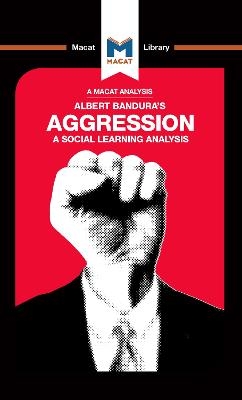
An Analysis of Albert Bandura's Aggression
A Social Learning Analysis
Seiten
2017
Macat International Limited (Verlag)
978-1-912303-54-0 (ISBN)
Macat International Limited (Verlag)
978-1-912303-54-0 (ISBN)
Much of what we now know about the influence of early childhood environments on delinquency and anti-social behavior can be traced to Bandura’s ground-breaking 1973 book. He uses the subject of aggression to demonstrate the usefulness of social learning theory.
Albert Bandura is the most cited living psychologist, and is regularly named as one of the most influential figures ever to have worked in his field. Much of his reputation stems from the theories and experiments described in his 1973 study Aggression: A Social Learning Analysis – a book that is both a classic of psychological study and a masterclass in the analytical skills central to good critical thinking. Bandura’s central contention is that much human learning is fundamentally social. As children imitate the behavior of those around them, and as their behaviors are reinforced by modelling, they entrench cognitive functions that more or less become part of their core personalities.
The experiments that Bandura designed in order to prove his contentions with regard to learned aggressive tendencies show the powers of critical thinking analysis and evaluation at their best. Having set up a play environment for children in which they could be exposed to aggressive behavior (inflicted on a bobo doll), he was able to systematically examine their responses and learned behaviors, working out their functions and understanding the relationships between different aspects of behavior that combined to form a whole. Carefully evaluating at each stage the different extent to which children’s own aggressive behavior was affected by and modelled on what they saw. Bandura produced results that revolutionized psychology’s whole approach to human learning and behavior.
Albert Bandura is the most cited living psychologist, and is regularly named as one of the most influential figures ever to have worked in his field. Much of his reputation stems from the theories and experiments described in his 1973 study Aggression: A Social Learning Analysis – a book that is both a classic of psychological study and a masterclass in the analytical skills central to good critical thinking. Bandura’s central contention is that much human learning is fundamentally social. As children imitate the behavior of those around them, and as their behaviors are reinforced by modelling, they entrench cognitive functions that more or less become part of their core personalities.
The experiments that Bandura designed in order to prove his contentions with regard to learned aggressive tendencies show the powers of critical thinking analysis and evaluation at their best. Having set up a play environment for children in which they could be exposed to aggressive behavior (inflicted on a bobo doll), he was able to systematically examine their responses and learned behaviors, working out their functions and understanding the relationships between different aspects of behavior that combined to form a whole. Carefully evaluating at each stage the different extent to which children’s own aggressive behavior was affected by and modelled on what they saw. Bandura produced results that revolutionized psychology’s whole approach to human learning and behavior.
Jacqueline Allan is a doctoral candidate in Psychology at Birkbeck, University of London and director of the charity Diabetics with Eating Disorders.
Ways In to the Text Who is Albert Bandura? What does Agression Say? Why does Agression Matter? Section 1: Influences Module 1: The Author and the Historical Context Module 2: Academic Context Module 3: The Problem Module 4: The Author's Contribution Section 2: Ideas Module 5: Main Ideas Module 6: Secondary Ideas Module 7: Achievement Module 8: Place in the Author's Work Section 3: Impact Module 9: The First Responses Module 10: The Evolving Debate Module 11: Impact and Influence Today Module 12: Where Next? Glossary of Terms People Mentioned in the Text Works Cited
| Erscheinungsdatum | 27.07.2017 |
|---|---|
| Reihe/Serie | The Macat Library |
| Verlagsort | London |
| Sprache | englisch |
| Maße | 129 x 198 mm |
| Gewicht | 272 g |
| Themenwelt | Geisteswissenschaften ► Philosophie |
| Geisteswissenschaften ► Psychologie ► Allgemeine Psychologie | |
| Geisteswissenschaften ► Psychologie ► Entwicklungspsychologie | |
| Geisteswissenschaften ► Sprach- / Literaturwissenschaft ► Anglistik / Amerikanistik | |
| Geisteswissenschaften ► Sprach- / Literaturwissenschaft ► Literaturwissenschaft | |
| Sozialwissenschaften ► Pädagogik | |
| ISBN-10 | 1-912303-54-X / 191230354X |
| ISBN-13 | 978-1-912303-54-0 / 9781912303540 |
| Zustand | Neuware |
| Informationen gemäß Produktsicherheitsverordnung (GPSR) | |
| Haben Sie eine Frage zum Produkt? |
Mehr entdecken
aus dem Bereich
aus dem Bereich
Techniken der Verhaltenstherapie
Buch (2024)
Julius Beltz GmbH & Co. KG (Verlag)
35,00 €


